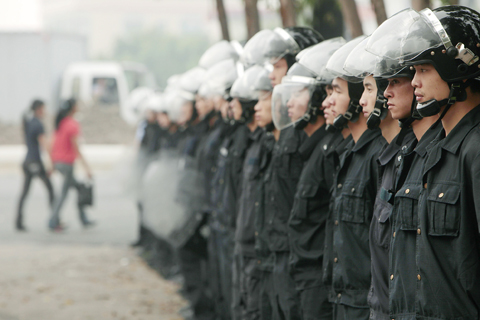|
¡@
China sees increase in labor unrest
ON STRIKE: Chinese workers accepted their lot during the global downturn, but
with China booming again, workers demand better wages
AP , SHANGHAI
Saturday, Jun 12, 2010, Page 4

Riot police stand by outside a Honda Motor
factory as workers go on strike in Zhongshan, Guangdong Province, yesterday.
About 500 striking workers at a Honda Motor Co auto parts factory in southern
China refused management demands to return to work yesterday, holding out for
higher pay and more freedom to form unions.
PHOTO: REUTERS
Workers demanding higher wages rallied outside a Honda plant
in southern China yesterday, part of a rash of industrial action at Chinese
factories highlighting growing restiveness among migrant workers.
Several hundred workers gathered at the front gates of parts supplier Honda Lock
(Guangdong) Co in the city of Zhongshan, Guangdong Province, where staff walked
off the job on Wednesday.
A policeman reached by phone at the city¡¦s Xiaolan precinct confirmed the
action, but said he was unable to release details without permission.
¡§We¡¦re keeping our eyes on this strike,¡¨ the officer said, refusing to give his
name, as is common with Chinese government workers.
An official from the official Chinese Communist Party controlled-union in
Zhongshan said representatives had been sent to the scene to ¡§handle it.¡¨
She refused to give details or her name.
A receptionist who answered the plant¡¦s main number said executives were in
meetings and no information could be released. A Honda Motor Co spokeswoman in
Tokyo, Yasuko Matsuura, said she had no details about the present situation.
Yesterday¡¦s rally came as Honda was resuming production at two other car
assembly plants after resolving a three-day strike at parts supplier Foshan
Fengfu Autoparts Co.
Honda said the factory employees agreed to a pay raise of 366 yuan (US$53.60)
per month for each full-time worker. That would increase pay for a new employee
to 1,910 yuan per month.
Some workers held out for more and the union said about 30 people fought with
union officials on Monday.
Japan¡¦s Brother Industries Ltd also said it had ended a week-long strike that
had stalled production at its industrial sewing machine factory in the central
city of Xian. Another strike, at a Taiwan-run rubber products plant west of
Shanghai, also ended earlier this week after workers took to the streets
demanding wage hikes.
Such incidents are an unsettling development for foreign manufacturers and a
privileged communist leadership now far removed from its roots in labor
movements a century ago.
Younger Chinese now seeking work in factories were raised in an era of relative
plenty and have higher expectations and less tolerance for highly regimented
factory living.
A spate of worker suicides at the mammoth factory complex operated by iPhone
maker Foxconn in the southern city of Shenzhen has drawn particular attention to
the intolerable stresses many young workers face on factory floors run with
military-style discipline.
Geoffrey Crothall, spokesman for the Hong Kong-based China Labor Bulletin, said
workers had largely been willing to bide their time and accept their wages
during the recent economic slowdown.
But since the economy began to boom again last year, they¡¦ve found themselves
working longer hours with no appreciable improvement in income, prompting some
to take action, Crothall said.
¡§They see strikes have been successful elsewhere and decide to try their luck,¡¨
he said.
Crothall said the strikes also revealed deep disdain for official union
representatives, who are appointed by management and the Communist Party rather
than elected by the workers themselves.
However, he questioned media reports saying the Honda Lock workers wanted to
form their own independent union, saying it was more likely a desire simply to
elect their own leaders who represented their own, and not management¡¦s,
interests.
After getting battered by recession last year, Japanese companies are
increasingly shifting production to China to tap its lower labor costs and get
closer to its fast-growing market. But companies that rely on China for cheap
labor are increasingly finding it hard to attract and keep workers, who want
better pay and working conditions.
Japanese factories also often employ young workers in groups from a particular
school or community, making them more likely to join together against an
employer if they are dissatisfied. While little reported in the state-controlled
media, word of working conditions and strikes spreads quickly via the Internet
and mobile phone text messaging.
China¡¦s communist leaders, who have ruled since the 1949 revolution, are acutely
aware of the power of worker unity, given their own origins in the labor
movements of the early 20th century.
¡@
|
![]()
![]()
![]()